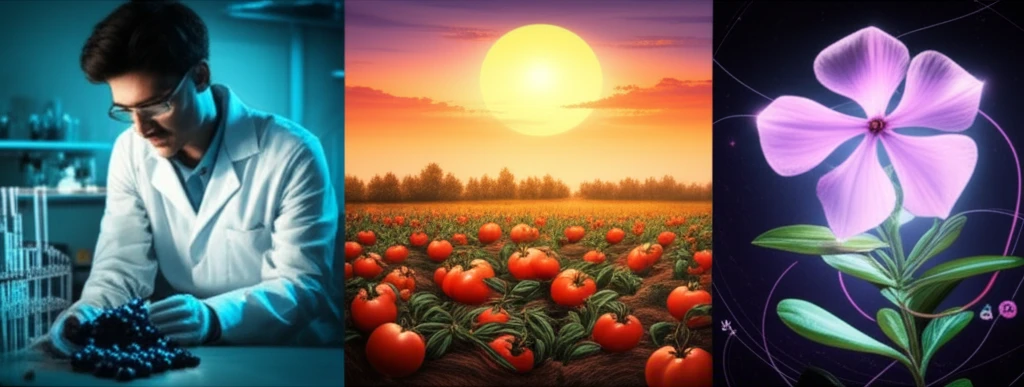
Unlocking Nature's Potential: How Plant Research is Shaping the Future of Medicine and Agriculture
"From combating Salmonella with Aronia to enhancing vincristine production, explore the latest breakthroughs in plant-based solutions for health and sustainable agriculture."
For centuries, plants have been a source of medicine and sustenance. Modern science is now unlocking their secrets at an unprecedented rate, with research revealing new ways to leverage their power for human health and agricultural advancement. Recent studies highlight the diverse applications of plant-based solutions, from fighting bacterial infections to improving crop tolerance.
This article delves into some of the most promising developments in plant research, showcasing how scientists are harnessing the natural capabilities of plants to address critical challenges in medicine and agriculture. We'll explore how extracts from wild berries can combat antibiotic-resistant bacteria, how magnetic fields can boost the production of anti-cancer agents in specific plants, and how understanding the genetic makeup of crops can lead to drought-resistant varieties.
By examining these studies, we aim to provide insights into the potential of plant-based solutions for a healthier and more sustainable future. Whether you're interested in natural remedies, sustainable agriculture, or the latest scientific breakthroughs, this exploration of plant research offers valuable knowledge and a glimpse into the exciting possibilities that lie ahead.
Aronia Melanocarpa: A Natural Weapon Against Salmonella

Antibiotic resistance is a growing global threat, prompting researchers to seek alternative solutions to combat bacterial infections. One promising avenue is the use of natural plant extracts, which have been shown to possess antimicrobial properties. A recent study investigated the effects of methanolic extract from Aronia melanocarpa (black chokeberry) on Salmonella typhimurium strains isolated from wild birds.
- Why this matters: Salmonella infections pose a significant public health concern, and the rise of antibiotic-resistant strains necessitates the development of new treatment strategies. Aronia melanocarpa extract presents a potential natural alternative to traditional antibiotics.
- Key Findings: The methanolic extract of Aronia melanocarpa demonstrated antibacterial activity against Salmonella typhimurium strains isolated from wild birds.
- Future Implications: Further research is needed to determine the optimal dosage and delivery methods for Aronia melanocarpa extract, as well as to evaluate its efficacy in vivo. However, these findings suggest that Aronia melanocarpa could be a valuable tool in the fight against Salmonella infections.
The Future is Green: Embracing Plant-Based Solutions
The studies discussed in this article represent just a small fraction of the ongoing research exploring the potential of plants to address critical challenges in medicine and agriculture. As we continue to unravel the secrets of the plant kingdom, we can expect to see even more innovative applications emerge.
From developing new drugs to enhancing crop resilience, plant research holds the key to a healthier and more sustainable future. By investing in this field, we can unlock nature's potential and create a world where both people and the planet thrive.
The convergence of biology, genetics, and agricultural science paves the way for groundbreaking discoveries that can transform healthcare and agriculture. It encourages continued exploration and responsible application of plant-based solutions for a better future.
